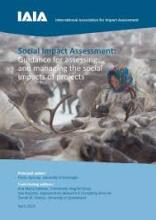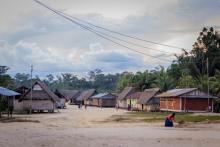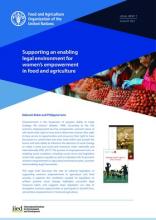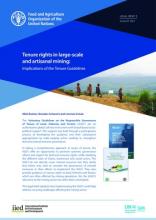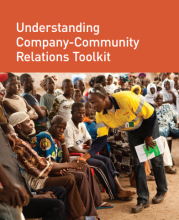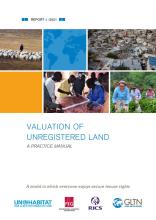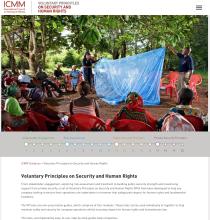Resources for E&S impact assessment
Social and Environmental Code of Practice (SECoP) for Responsible Commercial Agriculture in Ethiopia
The Social and Environmental Code of Practice (SECoP) for Responsible Commercial Agriculture is designed to help investors in ensuring that their investments are inclusive, sustainable, transparent, and respect human rights. While it focuses on Ethiopia, it will be a useful resource for investors and companies operating in other countries.
Social Impact Assessment: Guidance for assessing and managing the social impacts of projects
This Guidance Note provides advice about what is expected in good practice social impact assessment (SIA) and social impact management processes, especially in relation to project development. It is intended for private sector actors, government agencies, development banks and agencies, civil society organisations, and service providers. It provides guidance to help reduce companies' risk exposure and assist them in being compliant with international standards and/or good practice as they evolve over time by addressing significant human rights issues associated with a project.
Stepping up: Protecting collective land rights through corporate due diliegence
This guide is intended to supplement other resources that provide broader overviews of human rights due diligence. It will be particularly helpful for downstream businesses or investors as they navigate how to identify, address, and track the impacts of their value chains on indigenous peoples. The guide will also be useful for policymakers as they design due diligence legislation.
Supporting an enabling legal environment for women’s empowerment in food and agriculture
Empowerment is the “expansion of people’s ability to make strategic life choices”. According to the UN, women’s empowerment has five components: women’s sense of self-worth; their right to have and to determine choices; their right to have access to opportunities and resources; their right to have the power to control their own lives, both within and outside the home; and their ability to influence the direction of social change to create a more just social and economic order, nationally and internationally. The process of empowerment rests on enabling social conditions including social norms and legislative action that supports equality as well as individual will. To promote women’s empowerment in agriculture and food security, countries need enabling legal frameworks.
Tenure rights in large-scale and artisanal mining: Implications of the Tenure Guidelines
In taking a comprehensive approach to issues of tenure, the Voluntary Guidelines on the Responsible Governance of Tenure of Land, Fisheries and Forests (VGGT) offer an opportunity to promote systemic governance reform and respect for land and resource rights, while clarifying the different roles of States, businesses and social actors. The VGGT do not directly cover mineral resources but they clarify that States may wish to consider the governance of mineral resources in their efforts to implement the VGGT. They also provide guidance on tenure rights to land, fisheries and forests, which are often affected by mining operations. Yet, the VGGT’s relevance to the mining sector has often been overlooked.
This legal brief explores how implementing the VGGT could help address recurring challenges affecting the mining sector.
Understanding Company-Community Relations Toolkit
This guide is an aid for companies to achieve positive and resilient rapports with their host communities. It provides accessible information to understand factors that have an influence on community support and how this can be measured.
Valuation of Unregistered Land – A Practice Manual
Value, and its attribution to unregistered land, is important information for effective land acquisition, taxation and transfer processes and a key component of land administration systems.
This manual presents a practical approach to the valuation of unregistered land. It is designed to aid implementation of Valuation of Unregistered Lands: A Policy Guide, prepared by the Global Land Tool Network for the United Nations Human Settlements Programme (UN-Habitat), in combination with the international valuation standards of the International Valuation Standards
Council. The manual comprises two parts. The first gives an overview of recommendations related to the valuation of unregistered land rights, and the second provides more detail about what to consider when working in this complex environment.
Voluntary Principles on Security and Human Rights
This set of Voluntary Principles on Security and Human Rights (VPs) have been developed to help any company looking to ensure their operations are undertaken in a manner that safeguards respect for human rights and fundamental freedoms. The tools, accompanied by easy-to-use, step-by-step guides help companies:
• Reduce production delays
• Maintain “Social License to Operate”
• Gain access to financing • Lessen litigation risk
• Maintain/enhance company reputation
• Operate successfully in complex business environments
When Oil, Gas or Mining Arrives in Your Area: Practical Guide for Communities, Civil Society and Local Government on the Social Aspects of Oil, Gas and Mining
This guide aims to help local organisations, communities and governments to carry out constructive, peaceful engagement and negotiation with companies and government, with the aim of achieving sustainable development and improved quality of life. Its main objectives are:


